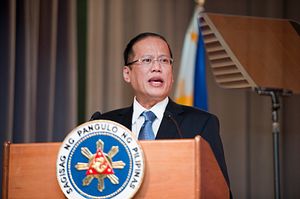On Tuesday, Philippine President Benigno Aquino made several provocative comments that will have regional neighbors cheering and jeering in turn. While speaking at the presidential palace in the capital of Manila to Japanese reporters, Aquino outlined his desire to work more closely with Japan on matters of security, shortly before accusing China of complicating an already delicate situation in the South China Sea. While he gave the appearance that the two issues were separate, by including them in the same set of remarks, and particularly before a Japanese audience, Aquino demonstrated a desire to conflate them without directly trying to provoke confrontation.
The president expressed his hope that the Philippine military and the Japanese Self-Defense Forces might conduct joint exercises “somewhere down the line,” and called Japan the Philippines greatest strategic partner after the U.S. He also showed support for Japan’s reinterpretation of Article 9 of the Constitution, saying “You would want to be assured that your partners… would be able to assist you if you came to a predicament.”
Aquino couched his support for Japanese military normalization by noting how Filipino forces in the Golan Heights became isolated and threatened by Syrian rebels both last March and this August, and that Japan pulled its forces out of the area much sooner than the Philippines. The Kyodo News reported him as saying “The restrictions imposed on Japan would be, if we were attacked, we couldn’t count on them to help us . . . given the needs, you would really want to have very good cooperation with every other partner country.”
In relation to China, Aquino said its aggressiveness in the South China Sea, particularly through drawing territorial lines close to its neighbors’ shores and reclaiming islands and shoals within those areas, is complicating regional relations. According to the Nikkei, he said these activities could affect the South China Sea’s freedom of navigation, and that “the world should be vocal about it lest (countries) give the impression that nobody cares.”
The Japanese government will be pleased with both sides of these remarks. Japan has sought to strengthen its ties with Australia as well, and a growing relationship with the Philippines is a natural outgrowth of Abe’s regional security strategy. The challenge to China in the South China Sea is also something that Abe has sought to support, particularly when he spoke at the Shangri-La Dialogue in May. Finding partners to challenge China in East Asia is a core tenet of both Japanese and U.S. strategy. As a result, Aquino’s comments can be expected to receive both rhetorical and substantive support from his two biggest allies.

































